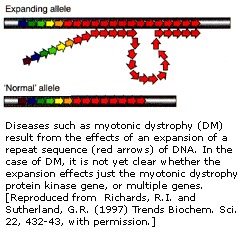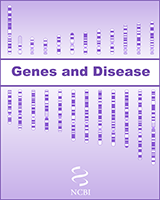NCBI Bookshelf. A service of the National Library of Medicine, National Institutes of Health.
National Center for Biotechnology Information (US). Genes and Disease [Internet]. Bethesda (MD): National Center for Biotechnology Information (US); 1998-.

Myotonic dystrophy is an inherited disorder in which the muscles contract but have decreasing power to relax. With this condition, the muscles also become weak and waste away. Myotonic dystrophy can cause mental deficiency, hair loss and cataracts. Onset of this rare disorder commonly occurs during young adulthood. However, it can occur at any age and is extremely variable in degree of severity.
The myotonic dystrophy gene, found on chromosome 19, codes for a protein kinase that is found in skeletal muscle, where it likely plays a regulatory role.
An unusual feature of this illness is that its symptoms usually become more severe with each successive generation. This is because mistakes in the faithful copying of the gene from one generation to the next result in the amplification of a genomic 'AGC/CTG triplet repeat', similar to that found in Huntington disease. Unaffected individuals have between 5 and 27 copies of AGC/CTG, myotonic dystrophy patients who are minimally affected have at least 50 repeats, while more severely affected patients have an expansion of up to several kilobase pairs.
- Genome view see gene locations
- Entrez Gene collection of gene-related information
- BLink related sequences in different organisms
- Research articles online full text
- Books online books section
- OMIM catalog of human genes and disorders
- GeneReviews a medical genetics resource
- Myotonic dystrophy - Genes and DiseaseMyotonic dystrophy - Genes and Disease
Your browsing activity is empty.
Activity recording is turned off.
See more...
